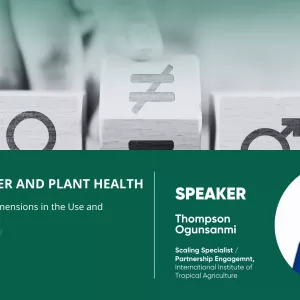Empowering Women in Agriculture: AKILIMO's Journey Towards Gender-Responsive Advisory Services
This article summarizes a presentation titled “Insights on Gender Dimensions in the Use and Uptake of AKILIMO in Nigeria, Ghana, and Tanzania” by Thompson Ogunsanmi from the International Institute of Tropical Agriculture (IITA). Delivered as part of the 13th Gender and Plant Health Webinar, the session focused on gender aspects of the site-specific fertilizer app AKILIMO, highlighting connections with gender

Empowering Women in Agriculture: AKILIMO's Journey Towards Gender-Responsive Advisory Services
This article summarizes a presentation titled “Insights on Gender Dimensions in the Use and Uptake of AKILIMO in Nigeria, Ghana, and Tanzania” by Thompson Ogunsanmi from the International Institute of Tropical Agriculture (IITA). Delivered as part of the 13th Gender and Plant Health Webinar, the session focused on gender aspects of the site-specific fertilizer app AKILIMO, highlighting connections with gender dimensions in plant health apps and shared challenges and opportunities. The webinar recording is available here.
The webinar explored strategies to overcome disciplinary barriers and effectively integrate plant health into an interdisciplinary farmer advisory platform. Organized monthly by the Sustainable Farming Area of Work on Plant Health fostering a rich discussion on advancing gender-responsive, integrated digital advisory tools for agriculture. For more information on AKILIMO, visit their website: https://akilimo.org/.
Empowering Women in Agriculture: AKILIMO’s Journey Towards Gender-Responsive Advisory Services
AKILIMO is a suite of site-specific agronomic decision-support tools (DSTs) designed to boost productivity while actively addressing gender barriers in agriculture across Nigeria, Ghana, and Tanzania.
Farmers generally face significant hurdles—including limited access to land, credit, extension services, mobile devices, and agricultural inputs—exacerbated by literacy gaps and cultural norms, creating systemic disadvantages. At the onset, women’s participation in AKILIMO was significantly lower, underscoring a clear gender gap in access and use. Through deliberate and sustained efforts to address these barriers, women’s representation has since risen to 38% of AKILIMO users, marking a notable step towards greater inclusion.
To further bridge and improve this, AKILIMO adopted gender-responsive scaling approaches, beginning with value chain mapping to identify gender-specific constraints and opportunities. The aim was to tailor content, communication channels, and extension methods to meet women’s unique needs.
AKILIMO’s Key Innovations
- Tailored Content and Communication
Tools were customized to reflect women’s constraints such as smaller landholdings and labor availability. Examples include “Best Planting Practices” for small plots and cassava-maize intercrop advice suited to mixed cropping common in women-led fields.
Video content in local languages was prioritized, enabling women to watch repeatedly for better comprehension. Audio content was developed for users with limited literacy. Simple language, visuals, and pictorials enhanced ease of use. - Strategic Partnerships and Capacity Building
AKILIMO built partnerships with organizations focused on gender and agriculture, including women-led Saltry International in Nigeria, which championed women farmers by offering pre-financing. Smaller fertilizer packs accommodated limited funds. More than 9,000 extension agents were trained, with deliberate efforts to include female agents. - Gender-Sensitive Governance and Monitoring
Partner associations integrated gender perspectives into governance by reserving women’s positions in national executive committees to ensure representation. A gender-sensitive monitoring, evaluation, and learning (MEL) framework with sex-disaggregated data enabled adaptive scaling based on feedback.
Impact Highlights
- Over 1.8 million farmers reached across the three countries, with women comprising 38% of users.
- Among 513,886 unique farmers engaged, 76% adopted recommended practices, achieving a 22% average increase in cassava root yields over 441,500+ hectares.
- Women nearly reached parity in adoption at 49%. Their fertilizer use, initially zero, now exceeds that of men due to tailored interventions.
- Behavioral shifts revealed women’s relatively higher willingness to take risks with fertilizer application, while men showed greater risk tolerance with ploughing.
- Access to output markets significantly increased from 23% in 2021 to 93% in 2024.
Lessons Learned
- Embed innovations within diverse partnership structures.
- Develop gender-sensitive dissemination and training strategies.
- Tailor ICT training to address gender-specific needs.
- Factor cultural and contextual considerations into program design.
- Root AKILIMO in women’s cooperatives and prioritize training female extension agents.
In conclusion, AKILIMO’s gender-responsive approach has effectively mainstreamed inclusivity throughout its ecosystem, ensuring advisory tools are accessible and relevant to both women and men farmers. This commitment is fostering more equitable agricultural practices and empowering women across Africa.
About the Webinar Series
The webinar series is organized by Gender and Plant Health Global Research Network under the CGIAR Sustainable Farming Program.

